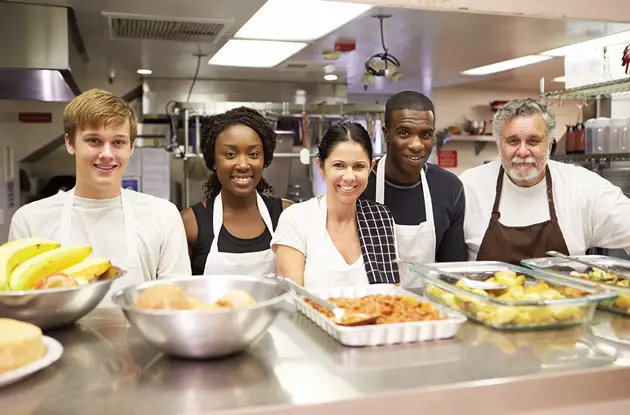In the current climate, it's important for everyone to be global citizens who are aware of what's happening around the world. From politics to social issues, more and more young adults are "woke" teens who are leading movements and getting involved. So how can you ensure you're raising a global citizen? Read on for expert tips.
Every few minutes our phones light up with the latest news alert. From social issues to politics, there seems to be a constant flow of news cycling from around the globe. Being world-aware means understanding these issues and educating yourself about what is going on outside of yourself, your home, and your immediate neighborhood. For your teen, it also means realizing there is a world outside the latest video game or most recent post on Instagram.
It isn’t always easy for your child to look beyond the bubble he exists in, though. A variety of things, from the technology that surrounds him to your own protective parenting style, can make it difficult. But with a little guidance from you, your teen can get on track to becoming a global citizen. It will benefit him, and the whole world, in the long run.
The Importance of World-Aware Teens
We constantly hear that children are most likely to take risks when they’re in their teens. Sure, this can lead to accidents. But their risk-taking can also be a positive thing, putting them on the path to innovation, says Teodora Pavkovic, a parenting coach with a master’s degree in clinical psychology.
The teenage years are the “most creative period of our lives,” Pavkovic says. “I think if we harness that teenage brain energy that they have, it can really make a big change for the world…[Teens] are just naturally very inquisitive, innovative. They have ideas all of the time. They want to try things out. I think they can probably help us figure things out more than we can do on our own.”
The teenage years are also a time of self-exploration, and being world-aware aids a teen in figuring out her own identity, says Sophie Stoyadinovich, M.D., a life coach at Nobel Coaching, an online coaching and tutoring platform. Your teen should have as much information as possible to see where her particular interests lie and what kinds of problems she may like to solve. In fact, being world-aware might completely alter her direction in life.
What’s Blocking Your Teen’s Worldview?
While it’s only natural to feel protective of your child, being a helicopter parent can cause more harm than good. “[Kids] could get so comfortable that they become fearful of doing anything outside of their comfort zone, or you will have the flip side when they become very rebellious at some point, and you don’t want either one,” Pavkovic says.
Technology can act as the other main roadblock that keeps children from being world-aware, she adds. While our devices give us access to almost any information we may need, a passive use of technology (such as scrolling through social media) has the potential to draw people into themselves in a negative way, she explains.
Along with this comes a lack of critical-thinking skills. “We take our view of the world from the media, from the news...and from the things that elicit the click response,” says Andrew Sachs, CEO of Nobel Coaching. “That is a… severely distorted version.”
Instead, parents should teach children of all ages to have a critical eye toward the information they take in. “They will be on social media. They will read things and they will see things on TV. I think it is always good to keep that conversation going about what they think, why they think so, how accurate they think it is, and whether they have any other sources for that,” Stoyadinovich says.
Teaching Your Child to Think Global
While your child can grow up to be world-aware on his own, this is rarely the case. We humans have an instinctive tribal nature. While this tribalism served a great purpose when humans were pack animals, now it is simply a fear that holds us back from interacting with people and places that are different, Sachs explains. It takes a team of parents and teachers to coax a child into becoming more world-aware. Try these steps:
Talk about current events around the dinner table.
These stress-free, no-pressure conversations foster an environment in which your child can speak her mind. Listen to what she is passionate about and try to incorporate that into the conversations.
Get the Best Family Activities
Sent to You Weekly!
Pair your child with a pal from another place.
When your teen tries to learn a language, connect her with a student in another country who speaks the language fluently. In the process of helping each other learn, they will hear about each other’s daily life. Even if it’s only an online call or chat, it is an immersive experience.
Volunteer.
It’s an easy yet effective way to get your child involved with the surrounding community, explains Zelda Warner, president of the Volunteer Referral Center. And it’s a two-way street: As your child helps someone, that person simultaneously impacts his life by opening his eyes and allowing him to see the world through a new lens. He will learn to appreciate those differences, and also see how lucky he is to live the life he leads.
Travel.
If you can, take a family vacation to another country or give your child the opportunity to participate in a student-exchange program. And do so as soon as you are able; the sooner you travel, the earlier your child’s brain begins to expand, Sachs says. “They are able to see the world for what it is, and they are not constrained by the little bubble. A lot of us exist in a bubble,” he explains. “Having that kind of opportunity to connect with real people I think can drastically change your view on the countries they are from and the rest of the world.”
Likewise, even short cruises or camps expose children to others from around the country, or possibly the world, who will share experiences and stories. Dan Appleman, author of Developing Teen Leadership, suggests enrolling your child in a summer camp outside of her comfort zone. Send an athlete to theater camp or a musician to art camp. Send your teen to an overnight camp farther from home. These small changes will allow your child to meet peers with different backgrounds and experiences.
Take a cultural field trip to NYC.
Not up for international travel right now? You don’t have to venture far from home to help your child become more world-aware. Luckily, here in the New York area, we have the luxury of being surrounded by many different cultures and people from diverse backgrounds. A train ride will take you to Chinatown with Little Italy one block away. Talk to your child about these cultures and eat at authentic restaurants. You can also take him to one of the many cultural museums around New York. No matter what you do, this engaging experience will ignite his brain and get him thinking outside of his home.
Model world-aware behaviors.
Ultimately, remember your children are both mirrors and sponges, Pavkovic says—they reflect your behavior and absorb lessons from your actions. Whether you want your kids to use technology less, spend more time outdoors, or speak more kindly, you must do the same.
Appleman seconds this sentiment, recalling parents he knows who bring their children to protests. “Have them be world-aware and have them involved in your life. Yes, there are other things one can do in providing guidance, but there is nothing like setting an example,” he says.
This being said, “we need to take into account that the older your child is, the less they are under your influence. If they are seven, yes, obviously you are their greatest role model and you are the best,” Stoyadinovich says. “But as they grow older, their peers become that for them…Your direct influence, I think, at that point gets a little bit smaller and you need to lean more toward consulting with them and providing them with opportunities rather than instructing them and pushing them to do something.”
Look at what the students of Marjory Stoneman Douglas High School have done in Parkland, FL to raise awareness of gun violence. When one teen is world-aware and a leader, others will follow. In that case, millions from all over the world already have. At this rate, world-aware teens will be the ones to create a world-aware society.





